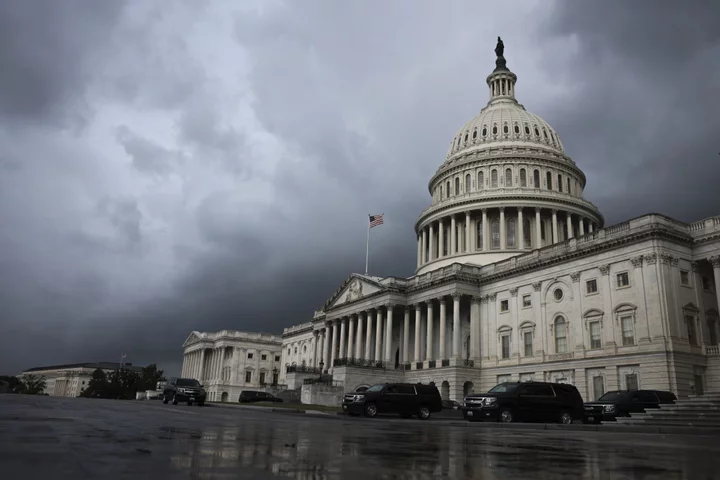House Republicans on Wednesday added hot-button culture war amendments to a critical defense policy bill, alienating Democrats and jeopardizing its passage as well as putting GOP lawmakers from more moderate districts in peril.
The House voted Thursday evening largely along party lines to overturn a policy guaranteeing access to abortion services for military members and ban military health insurance coverage of transgender care, attaching the amendments to legislation setting Pentagon policy and prescribing military spending levels for the next year. Another addition targeted racial diversity initiatives.
The clash over the $866 billion National Defense Authorization Act provides fresh warning of turmoil ahead in the struggle to fund the government before a shutdown that could come as soon as Oct. 1. It also thrusts Speaker Kevin McCarthy into yet another political storm.
The amendments could now jeopardize House approval of the overall defense authorization, which Congress has passed annually for more than 60 years, usually with bipartisan support.
Representative Jim McGovern, a Massachusetts Democrat, complained that the bill is being blown up “because of a fringe group in the Republican conference that can’t get enough in terms of their extremist agenda.”
As of Thursday, McCarthy and his top lieutenants were still unsure how much Republican support they could count on for the legislation and how much they would need to rely on Democrats, according to one lawmaker involved in their closed-door conversations who insisted on anonymity to describe the deliberations.
It remains unclear if the bill can pass with just Republicans votes given that some conservative amendments such as ending funding for Ukraine were defeated.
Some of the votes carry jeopardy for Republican swing-district lawmakers, particularly those in districts President Joe Biden won in 2020. In ads and on billboards, Democrats have already been trying to define some of those Republicans as extreme and out of step with their voters. At the same time, many of the culture war issues appeal to Republican primary voters.
House Democratic Leader Hakeem Jeffries assailed swing-district New York Republicans for the votes, saying they “pretend to be moderate” but “are actively working to destroy reproductive freedom for military women and their families.”
Abortion, LGBTQ
The slender Republican majority gives any determined group outsized leverage and hard-liners have been flexing that power. A group of them used a procedural tactic to grind the House to a halt in June because they were unhappy with concessions in a deal McCarthy made with Biden to avert a US default. Ultra-conservatives insisted on votes on the culture-war amendments to the national security authorization.
The House voted to add provisions that would block the Defense Department from paying for or reimbursing expenses relating to abortion services; stop health insurance for military families from covering gender hormone treatments or sex reassignment surgeries for transgender individuals; curtail diversity, equality and inclusion initiatives and block Defense Department school funding from being used “to promote race-based theories.”
But the far-right effort to cut off US aid to Ukraine failed despite backing from 70 Republicans.
The House will also consider provisions that would block Biden’s climate change orders and ban federal funds from being used toward renaming military bases, including those that have memorialized Confederate figures.
Poison Pills
Chip Roy, a Texas Republican who sits on the Rules Committee, was instrumental in forcing the amendment votes.
“These are a lot of very good common-sense amendments,” he said. “They cover the gamut of issues that the people of America care about.”
Democrats largely consider the hard-liners’ amendments “poison pills” they wouldn’t swallow to vote for the measure.
Without some Democratic backing, McCarthy won’t be able to pass the bill unless he can convince almost every Republican to support it. The defense legislation authorizes, among other things, pay increases for the armed forces as well as military construction projects.
As that dispute unfolds, other storm clouds are gathering. The conservatives in the Freedom Caucus have pushed House leaders to draft government spending bills that cut funding $120 billion below this summer’s debt ceiling deal, ensuring that House Democrats will not support the legislation.
The spending measures, for instance, would cut the Environmental Protection Agency by 39% and Labor Department by 29%.
The bills also bow to a slew of conservative demands such as to cut FBI and Justice Department funding in retaliation for the investigation of former President Donald Trump’s alleged mishandling of classified documents and election interference and to eliminate diversity programs government-wide while banning the teaching of “critical race theory.”
--With assistance from Roxana Tiron.









